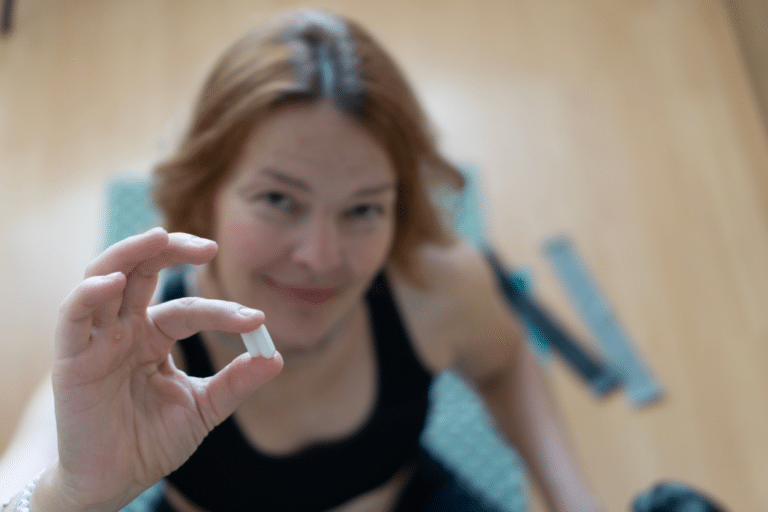Need a Sleep Solution in Perimenopause?
If perimenopause is wreaking havoc on your sleep, it may be tempting to resort to over-the-counter sleep aids (most contain antihistamines) or prescription medications.
But these don’t treat the root cause of insomnia and may lead to dependency. Over time, they work less effectively, which means you need higher and higher doses to do the job. As someone who’s been there and done that, I don’t recommend this approach. Get to the root of the problem. The most common root causes of insomnia in perimenopause and menopause are STRESS, low progesterone, low estrogen, high cortisol, and thyroid problems.
STRESS is capitalized for a reason… No amount of supplementation can fix a lifestyle that desperately needs a reset.
Supplements can help you sleep, but before you head to Whole Foods to create your own cocktail, please read my guidance in Chapter 9 of Perimenopause: The Savvy Sister’s Guide to Hormone Harmony and consider consulting with a professional about correct dosages and what core issue you’re managing.
Magnesium
Magnesium is an essential mineral, one of seven essential macro-minerals your body needs in large quantities. Unfortunately, the body does not produce magnesium, so it needs to come from outside sources. Common among adults, magnesium deficiency leads to restless sleep and frequent waking at night. I can personally say that magnesium has made a huge difference in my sleep. Maintaining healthy levels of this mineral often leads to deeper, more sound sleep because it helps maintain healthy levels of GABA.
GABA
Gamma-aminobutyric acid (GABA) is the primary inhibitory neurotransmitter in your central nervous system, your body’s natural “off” switch. GABA slows nerve activity in your brain, which leads to feelings of calm and relaxation. Research has shown favorable results using GABA supplementation. In one study, an amino acid preparation containing both GABA and 5-HTP, which your body produces from the amino acid tryptophan, reduced the time to fall asleep, increased sleep duration, and improved sleep quality. I prefer to use a liposomal form that also includes l-theanine.
Taurine
Taurine is an amino acid that reduces cortisol levels and increases the production of GABA. Try taking 500 mg before bed. Using magnesium taurate allows you to get magnesium and taurine with a single pill.
Passionflower
Studies suggest passionflower may be as effective as generalized anxiety disorder (GAD) medications. Combining it with other calming herbs such as valerian root and lemon balm, chamomile, hops, kava, and skullcap is common in herbal sleep blends. Because passionflower may help lower blood pressure, be careful when using this herb with blood pressure medications.
Valerian root
According to various studies, valerian reduces the time it takes to fall asleep and improves sleep quality, so it may be just what you’re looking for if you can’t sleep. Unlike many prescription sleeping pills, valerian has fewer side effects and is much less likely to result in morning drowsiness.
Lemon balm
Research is validating the benefits of lemon balm as an anti-anxiety/sleep supplement. A study of brainwaves showed that lemon balm was useful in reducing anxiety. In a two- to four-week study, taking two doses of 300 mg lemon balm extract helped reduce anxiety by up to 15% to 18% in 20 participants. This same study showed that lemon balm could reduce insomnia by up to 42%.
Adaptogenic herbs
Adaptogens increase the capacity of the body to adapt to stress and increase disease resistance. They don’t work on a specific body organ but have a “normalizing” effect on imbalances caused by physical or emotional stress. Ashwagandha is an herb shown to increase energy and mental alertness during the day. Research also indicates it can help you sleep better at night. You can take it alone (400 mg) or blend it with other adaptogens. If you are sensitive to nightshades, know that ashwagandha is in this family.
Sleep Solutions for Special Situations
Some supplements are indicated when you KNOW that you have a specific problem.
- If your cortisol rises at night, phosphatidylserine may be what you need.
- When your progesterone is low, you may need to supplement this. Oral progesterone is calming, and the breakdown of it in your body creates a metabolite that makes you drowsy.
- Low estrogen can cause insomnia, and replacement of this can make a big difference. It changed MY life!
A DUTCH test will show all of these situations.
I get many questions about my personal “sleep potion.” It includes 240 mg of magnesium glycinate, Cortisol Manager, melatonin, oral progesterone, and estrogen patches. What works for me may not work for you, so consider consulting with a professional about what products to try and determine the root cause of your insomnia.
If you’d like to see specific products with some of my favorite recommendations, create an account with me on Wellevate and then use this link to access my sleep protocol: https://wellevate.me/patient/protocol/70703. Creating an account is free and doesn’t obligate you to purchase anything.
Dr. Anna Garrett is a menopause expert and Doctor of Pharmacy. She helps women who are struggling with symptoms of perimenopause and menopause find natural hormone-balancing solutions so they can rock their mojo through midlife and beyond. Dr. Anna is the author of Perimenopause: The Savvy Sister’s Guide to Hormone Harmony. Order your copy at www.perimenopausebook.com.
Also, she offers a membership group, Hormone Harmony with Dr. Anna Garrett, which provides women in midlife with affordable expert guidance and community support.
Dr. Anna is available for 1-1 consultation. Find out more at www.drannagarrett.com/lets-




